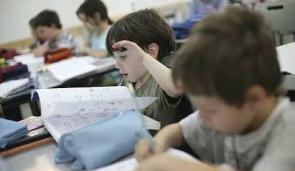Test results show children of immigrants from former Soviet Union outscore native-born Israelis
When the test scores are analyzed according to socioeconomic background, the children of parents from the CIS outscored the children of native-born Israelis in math, science and English by 30, 20 and 40 points respectively. And when the analysis compared the scores of children whose parents had fewer than 12 years of school, the children of immigrants from the CIS scored higher than the children of native Israelis in all subjects, with the exception of the eighth-grade Hebrew-language test.
The results were similar for the Program for International Student Assessment tests, administered in elementary and middle school. Among 15-year-olds, the children of immigrants from the CIS tested below the average for Hebrew-speaking schools, but again, when the comparison was according to socioeconomic status these children outscored their peers with native-Israeli parents.
By Talila Nesher

